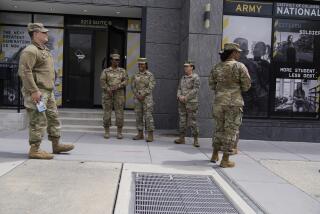Cold War Breakthrough
- Share via
President Bush managed to restrain his enthusiasm for the latest in a series of Soviet arms control moves, but that made it no less a major step back from the Cold War.
Soviet negotiators formally announced in Vienna on Tuesday that the Kremlin intends to cut its European ground forces by more than 1 million men (leaving 2 million) and dispose of tens of thousands of tanks, artillery pieces and armored vehicles. Vienna is the site of talks on cuts in ground forces of the East and the West that face one another in Central Europe.
The President welcomed the news, adding that even if the Soviets followed through on the announcement, their ground forces would dominate those of the North Atlantic Treaty Organization. Still, he said, making the proposal a formal part of conventional arms control talks means that negotiations over time could “change the military landscape of Europe.”
The move was not exactly a surprise. Soviet President Mikhail S. Gorbachev told Secretary of State James A. Baker III in Moscow nearly two weeks ago that the proposal was coming. At the time, Gorbachev went even further, saying that he would hope to limit the ground forces of both NATO and the Warsaw Pact nations to just over 1 million troops each.
Bush was at once cordial and cool in commenting both on the proposal and on future relations with the Soviets, a combination that is emerging simply as his style. He welcomed the proposed cuts, but said they did not go far enough. He spoke favorably of the INF medium-range nuclear missile treaty, but said he would go ahead with a Star Wars system to fight off incoming missiles and with plans to make MX nuclear missiles mobile and to build a new fleet of smaller missiles.
One theory offered to explain why nobody in the Administration said “whoopee” when the Soviet proposal became public is that Americans might start demanding radical cuts in all kinds of defense forces if their own leaders looked too favorably on Soviet promises to cut their military forces.
In that view, democracy is what one analyst called a “slippery slope” on which downward skids in defense would be difficult to stop. The theory is not very respectful of the judgment of Americans, but it can do little harm as a stab at explaining Washington’s cautious attitude toward Moscow.
But the caution itself does make United States relations with some West European allies more difficult. Many West Germans, for example, are indeed saying “whoopee,” and see no point in putting more or better nuclear missiles in or around their country while Gorbachev seems to be moving so rapidly toward a thaw in the Cold War. Washington wants to do just that, but it is also trying to find a compromise position to avoid turning this weekend’s 40th NATO anniversary meeting into a shouting match.
Gorbachev is canny enough to know that his timing could not have been better and that his proposal will at least share center stage at the meeting. But that cannot obscure the fact that the proposal is another breakthrough in the efforts of leadership in both countries to reduce the chance of conflict to a minimum. As one State Department official put it: “They’ve basically accepted our view.” And when the stakes are as high as they are in arms control, that kind of basic change in attitude is as rare as it is welcome.
More to Read
Sign up for Essential California
The most important California stories and recommendations in your inbox every morning.
You may occasionally receive promotional content from the Los Angeles Times.













